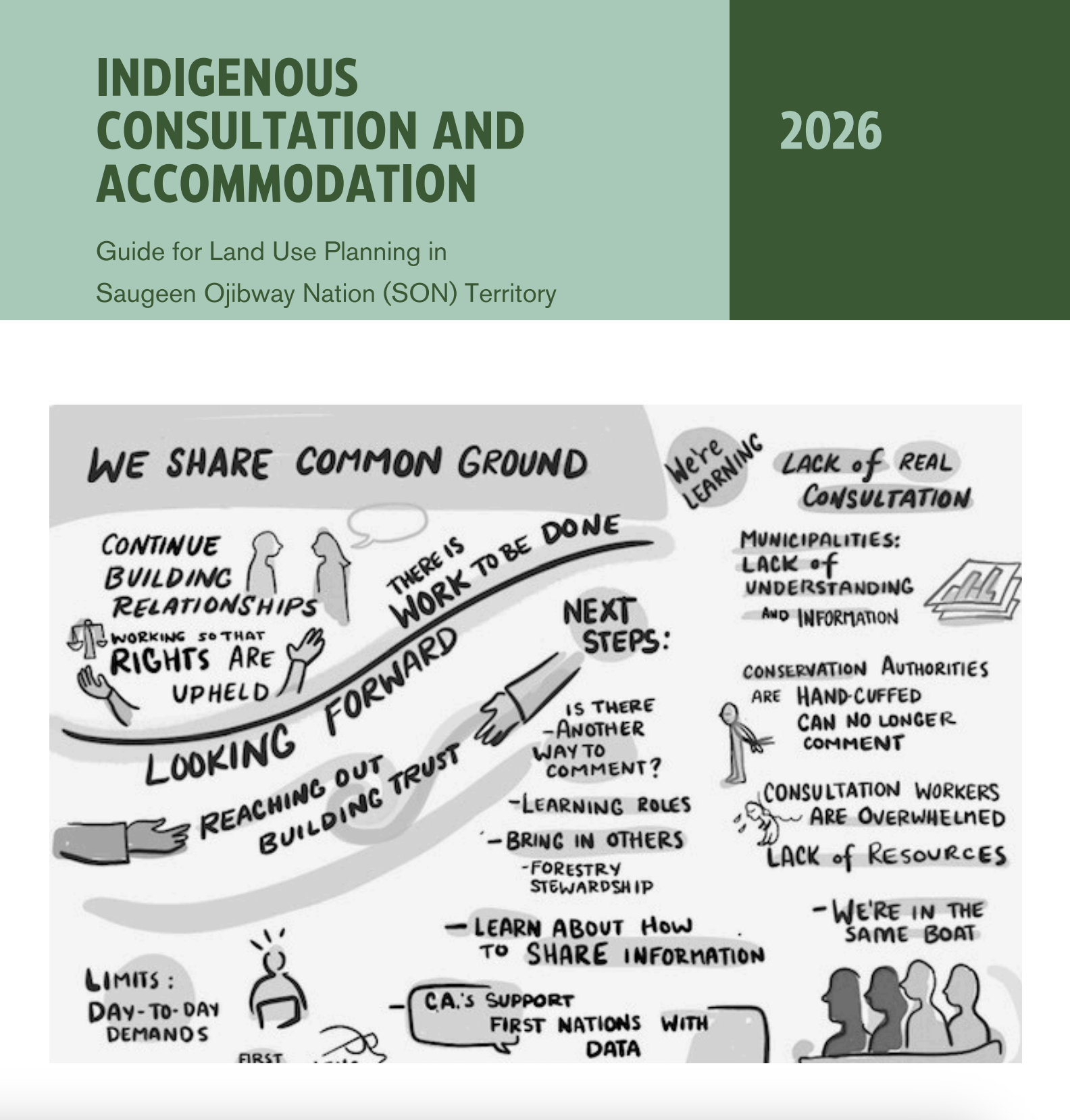Shared Path PPC Comments on Proposed Bill 23 (Schedule 6) – the Proposed More Homes Built Faster Act, 2022
Written by Admin, Admin •
On behalf of the Public Policy Committee of the Shared Path Consultation Initiative the following comments on proposed Bill 23 (Schedule 6) – the Proposed More Homes Built Faster Act, 2022 (ERO 019-6196) were submitted by email on November 17, 2022.
Dear Minister Clark,
It is with great concern that we submit these comments on Bill 23: More Homes Built Faster Act, 2022
herein referred to as “Bill 23”.
Given the overwhelmingly comprehensive nature of the Bill and the accelerated timetable for its
introduction, we are concerned that a matter of fundamental importance has been overlooked.
Specifically, the rights, interests and concerns inherent to those Indigenous to this landscape.
We assume you understand that all of Ontario is underlain by treaties. As such, there are Aboriginal
rights, Treaty Rights, not to mention the Inherent Rights of those who were here long before the
Province of Ontario existed. In an attempt to plan other people’s land we do run the risk of violating
these rights.
Below we outline the specific parameters concerning the government’s obligation to consult and
accommodate regarding this Bill.
Background: Housing Affordability Task Force and Bill 23
The Shared Path Consultation Initiative (Shared Path) is a charitable organization that addresses the
challenges and opportunities where land use change and Aboriginal and Treaty Rights intersect.
Planning has the potential to impact Indigenous political and territorial claims. In response to the TRC
Calls to Action 47, 57, and 92, Shared Path provides resources for First Nation, Métis, municipal, and
provincial governments, as well as professionals in land use change to better engage in consultation
and relationship-building.
In December 2021 Ontario’s Minister of Municipal Affairs and Housing appointed a
Housing Affordability Task Force (HATF) to recommend ways to accelerate progress in closing the
housing supply gap to improve housing affordability. The HATF released a report in early February
2022 that included a series of 55 recommendations to increase future housing supply.
On October 25, 2022, the Province released Bill 23, which introduces legislative changes to the
Planning Act, Development Charges Act, Heritage Act, and the Conservation Authorities Act to
address the issue of the need for more homes. The Province of Ontario states that Bill 23 supports the
ambitious goal recommended by the HAFT to build 1.5 million homes over the next 10 years. This Act
aims to change to the land use planning system to support building more homes faster based on the five following categories: Building more homes; Reducing costs, fees, and taxes; Streamlining
development approvals; Helping homebuyers and renters; and Better planning through merging
policy documents (Growth Plan and Provincial Policy Statement), etc..
Duty to Consult and Accommodate
1. The United Nations Declaration on the Rights of Indigenous Peoples has been belatedly
accepted by the Canadian government (2016). The result is that the “free, prior, and informed
consent” of Indigenous peoples when actions are taken regarding the lands and resources
traditional to their communities, is now part of Canadian jurisprudence.
2. The Constitution Act, 1982 contains two sections recognizing Indigenous rights.
a. Section 25 in the Charter of Rights and Freedoms states that Aboriginal, Treaty, or
other Rights or freedoms are not abrogated or derogated. It specifically mentions The
Royal Proclamation, 1763. It, along with the implementing Treaty of Niagara, 1764 is
one of the first planning policies on this continent and is grounded in a relationship
with the Crown.
b. Section 35 recognizes and affirms the “aboriginal peoples of Canada ” and their
Treaty Rights as exist now or as may be acquired.
3. Ontario, as the Crown, has a legal obligation to consult with Aboriginal peoples where it
contemplates decisions or actions that may adversely impact asserted or established
Aboriginal or Treaty Rights (court cases: Haida, 2004; Taku River, 2004; Mikisew Cree, 2005) .
4. The Province of Ontario understands that inherent in the Crown’s duty to consult is the
obligation to ensure that the concerns of the impacted Aboriginal people are addressed (court
cases: Sparrow, 1990, Delgamuukw, 1997).
5. This obligation now includes: formal notice, information, peer-review funding, and
accommodation of the concerns raised during consultation. Further, that cumulative effects
are the proper subject of consultation, and that private interests risk delayed projects by a
failure to consult (court case: SON, 2017).
After the fact consultation on reports that are prepared without considering their concerns and
mitigation measures conceived of without their participation will not discharge the Crown’s duty to
consult.
Provincial Policy Statement, 2020
Released on May 1st, 2020, the Provincial Policy Statement envisions a unique role in land-use
planning for Indigenous perspectives and the traditional knowledge of Aboriginal communities.
Planners are encouraged to facilitate a sharing of knowledge that will inform their decision-making
about land (Part IV: Vision). They are specifically instructed to coordinate land use matters through
the proper engagement of Indigenous communities (1.2 Coordination). The directive to build
constructive and cooperative relationships is significant given the Policy’s acknowledgement that
protecting the province’s natural heritage & biodiversity, water & Great lakes, agricultural, mineral,
and cultural heritage & archaeological resources, is vital for the economic, environmental, and social
health of all Ontarians, regardless of who they are (2.0 Wise Use). Engagement is also stipulated for
the identification, protection, and management of cultural heritage and archaeological resources (2.6
Cultural Heritage and Archaeology).
The PPS, 2020 references both Section 25 & Section 35 of the Constitution Act, 1982 and insists on
long-term, comprehensive, up-to-date official plans that integrate with Environmental Assessment
processes. Planners will also have to monitor and report on their PPS implementation efforts. These
will be according to evaluation criteria consulted upon with municipalities, public bodies,
stakeholders, and Indigenous Communities (4.0 Implementation).
Analysis of Bill 23 and Related Regulatory Changes
With ten Schedules, extending to 78 pages, we understand Bill 23 to be an Omnibus Bill proposing a
myriad of changes to Ontario’s Land Use Planning regime. Identified below are some of the repeals
and amendments of interest to Shared Path:
Schedule 2: Conservation Authorities Act (CAA)
First Nations and Metis communities have a long and abiding interaction with water. Its practical use
includes ecological, cultural, and spiritual functions which make both groundwater and surficial
features such as streams, rivers, wetlands, shorelines, and the Great Lakes themselves of immense
importance. A failure to consult them on legislation fundamentally altering our relationship to water,
risks violating their rights.
It is our understanding that Bill 23 proposes to:
- Allow Minister use of discretionary powers under the Planning Act that could lead to inappropriate development on wetlands and watercourses.
- Exempt certain municipalities from natural hazard permits where Planning Act approvals are in place, i.e. Permits will not be required within regulated areas (including wetlands) for activity that is part of a development authorized under the Planning Act.
- Remove “conservation of lands” and “pollution” as considerations in permit decisions.
- Ask “conservation authorities [to] identify potential conservation lands that could support housing development in the inventory of conservation lands they are required to create”.
- Rreeze conservation authority development fees as early as January 1, 2023. Preventing conservation authorities from appropriately modifying fees to ensure cost recovery will lead to deficits and compromise their ability to review applications in an complete and timely manner.
Schedule 7: Ontario Land Tribunal Act
TRC “Call to Action” 52 asks governments (federal, provincial, and territorial) and the courts to accept
Aboriginal title over land once a “claimant has established occupation over a particular territory at a
particular point in time” and that the burden of proving any limitations on these rights shifts to those
who assert that such limitations exist. The right of Indigenous communities to participate in the
current tribunal system is limited. Further restrictions on their right to appeal the planning of their land
risks violating this principle.
It is our understanding that Bill 23 proposes to:
- Remove third party appeal rights for planning decisions on Official Plan Amendments and Zoning By-law Amendments, meaning that members of the public would no longer be able to appeal a Council’s decision on these types of applications. Only developers will be able to appeal, as well as some government agencies.
- Remove appeal rights from ‘upper-tier municipalities without planning responsibilities’ for all categories of planning decisions, including new Official Plans, OPAs, Zoning By-laws amendments, consents, minor variances and plans of subdivisions.
- Increase power to order costs against a party who loses a hearing at the Tribunal.
- Increase power to dismiss appeals for undue delay.
- Prevent residents and community groups from appealing municipal planning decisions to the Ontario Land Tribunal.
- Not require Municipalities to hold public meetings on plans of subdivisions.
- Encourage the Tribunal to award costs against those who are unsuccessful.
- Use Ministerial Zoning Orders — which already proceed without public input — for land around transit stops without consulting the municipality.
Schedule 9: Planning Act
The miniscule amount of land dedicated to walkable, mixed use neighbourhoods in Ontario (5% at
best) means that development is devoted to sub-urban sprawl. Not only is this waste a swandering
of resources, it runs the risk of violating the “land-relationship planning” that Indigenous communities
envision for their land.
There are various amendments proposed to Ontario’s Planning Act, which are of concern for the
Shared Path and potentially treaty relations in Ontario, some of which include:
- The removal of approval authority responsibilities for lower-tier Official Plans (OPs) and Official Plan Amendments from upper-tier municipalities.
- The removal of requirements to notify the public about development plans.
- The removal of the right for the public to appeal municipal planning decisions.
- The abolishment of coordinated regional planning in Ontario’s Greater Golden Horseshoe (Durham, York, Peel, Halton and Waterloo as well as Simcoe County) by turning over planning to the local municipal level thereby reducing the larger regional coordination required for transit, infrastructure and resource management.
- The abolishment of the Growth Plan, which will remove systems planning that support efficient growth management.
General Bill 23 Comments
First Nations, Metis, and Inuit peoples have a primary relationship with the Crown. The fundamental nature of this relationship means that the honour of the Crown is always at stake in its dealings with Aboriginal Peoples (Haida, 2004). Redefining the roles and responsibilities of Ministers of the Crown risks
violating the honour of the Crown.
It is our understanding that Bill 23 intends to:
- Revise the definition of “Minister” so that there are discretionary powers for the Minister to review and change any conditions that a conservation authority might place on a permit.
- Empower the Minister to override municipal planning decisions (i.e. amend Officials Plans) and impose development.
Concurrent Policy Changes
Wetlands are of vital importance for the role they play in purification of water, the regulation of flood
waters, and the habitat for water creatures. Changing the way these are defined risks undermining
both their cultural and economic significance for Indigenous communities.
It is our understanding that the government is proposing several policy changes that may have
implications for the natural environment in Ontario concurrent to the changes proposed in Bill 23.
Changes are proposed to the Ontario Wetland Evaluation System (OWES) to revise the way wetlands
are evaluated that would allow for:
- Declassification of a single wetland unit as part of a previously evaluated wetland complex without requiring a complete re-evaluation of all units in the existing wetland complex.
- Removal of recognizing species at risk in the evaluation process of wetlands, a criterion that is currently a key factor in determining provincial significance.
- Removal of provincial oversight of the evaluation process with no central agency assigned to coordinate approval of wetland evaluations or be responsible for sharing information publicly.
At the same time, a replacement is proposed for the Provincial Policy Statement which provides
strong protections for Ontario’s farmland and natural heritage with a new instrument that aims to
streamline development and prioritize housing.
Finally, a natural heritage offsetting policy is proposed, which could lead to the questionable practices of natural heritage destruction without clear or appropriate replacement approaches. We would support a fulsome review of natural heritage policies in the province but such an effort must be done with sufficient time for meaningful consultation and it is not recommended that this be conducted concurrently with so many other changes to the planning regime.
Analysis of Proposal to Remove Lands from Greenbelt Protection
The Greenbelt Plan area is covered by a number of treaties that provide for Treaty Rights and
Aboriginal Rights within the Plan area. The removal of Greenbelt lands from protection, without
rigorous rationale or consultation of First Nations runs the risk violating the previous support of First
Nations for such concepts as the Greenbelt.
It is our understanding that to meet the housing crisis, the Government of Ontario also plans to open
up land for development – 7,400 acres of Greenbelt. The legislation proposes to unilaterally remove land under treaty from the Greenbelt and reduce other natural heritage policy protection which will
impact natural resources. This is a significant change to an important provincial law around
natural resource protection on lands under treaty. More importantly, given the expedited timeline, we
assume that it is unlikely that consultation has occurred. Finally, the lack of rationale for the removal
of land, which previously met Greenbelt criteria, undermines the value of existing laws, based on
whim rather than rigour.
The diminishment of Crown responsibilities is reflected in the advice rendered by the Ontario Housing
Affordability Task Force report which states ”a shortage of land isn’t the cause of the problem. Land
is available, both inside the existing built-up areas and on undeveloped land outside greenbelts. We
need to make better use of land.” (HAFT, page 10)
Conclusion
Bill 23 has wide reaching impacts related to environmental protections, regional planning, and public
participation. As rightsholders, First Nations, through their Inherent and Treaty Rights, affirmed
through Section 35 of the Constitution Act, 1982, must be consulted through the Duty to Consult on
any decisions that may affect their lands.
It is our opinion that Bill 23 may have an adverse impact on the natural environment of the
traditional territories of Indigenous communities. A lack of consultation and accommodation of these
concerns risk violating these rights.
In summary, we respectfully advise the Government of Ontario to pause in its efforts on Bill 23 and
delay its third reading until such time as consultation with First Nations, as rightsholders and treaty partners, has been adequately conducted.
Yours respectfully,
The Public Policy Committee of Shared Path Consultation Initiative




